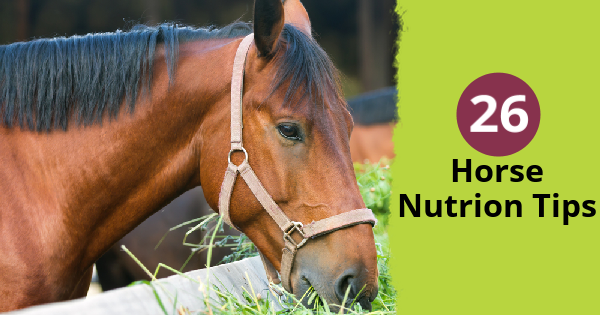Horses are not like your average house pet. They are a lot larger and require a lot of care, and have special nutritional needs. Sure, as you’re starting out, it’s understandable that you’re not going to know everything about horse nutrition. Here’s some horse nutrition tips to help you.
26 Horse Nutrition Tips

1. Never overestimate or underestimate your horse, even if they are easy to take care of. Make sure they are foraging properly and getting the right nutrition.
2. Horses don’t always need really fancy food. Giving them a choice of accessing grass, hay, or non-irrigated pasture will suffice.
3. If your pasture can’t provide enough nutrition for your horse, then you’ll want to supplement it by other means. If you need to do this, make sure to consult a veternarian.
4. It’s important that if you have land for your horse, that you rotate pastures so they won’t become overgrazed. A pasture that becomes overgrazed can start lacking the nutrients that your horse needs. Additionally, overgrazed pastures can become a haven for parasites because of an excess of manure.
5. Just like pets and kids, make sure to vaccinate your horse.
6. Make sure to have your horse checked by a dentist. If your horse has bad teeth, they will not be able to chew their food properly.
7. You should feed your horse by weight, not by volume
8. If you’re feeding hay to your horse, make sure to store any hay off of the ground. This prevents molding fromt occurring.
9. Make sure your horse is drinking clean water. This does help with digestion. If you have to, look into investing in a good watering system.
10. Got a pregnant or nursing mare, or foal? They have special needs in their diet, so consult your veternarian.
11. If you change your horse’s feed. Just like changing a pet’s food, you should introduce the new type of food slowly. It should take a few weeks to introduce new feed to your horse.
12. Beware of any grass that could be high in sugar, like lush green or brown grass.
13. Does your horse have a case of hay belly? Don’t assume that it means that they are overweight. Sometimes it could be a health issue.
14. Got a horse that is either really hyper or really lazy? Consult a veterinarian to see if their diet needs to be changed.
15. Make sure to de-worm your horse regularly. Parasites can steal your horse’s well needed nutrients.
16. Like humans, you should feed your horse smaller meals several times a day, rather than a large amount of feed twice a day.
17. Take your horse for a yearly wellness exam with your local veterinarian. This will allow you to know if your horse needs extra nutritional supplements, more exercise, or a change in feed.
18. Got an older horse? If your senior horse happens to have issues with chewing, check with a veterinarian about alternative feeds. Sometimes soaked hay pellets may work.
19. Exercise your horse regularly.
20. Always make sure to follow product label directions when you’re feeding supplements to your horse.
21. If your horse is needing to gain weight, look into asking your veterinarian about other options like fat supplementation, rather than increasing your horse’s grain rations.
22. Like to feed your horse treats? Make sure to feed treats in moderation.
23. Own a few horses. Make sure they’re sharing food, as some horses, when together, form a pecking order.
24.Is your horse obese? Consider switching out for grass hay. Make sure to introduce this slowly into their diet.
25. Consider supplementing your horse’s feed with all-natural nutrition like the highly digestible Olewo Carrots for Horses and Olewo Red Beets for Horses. Not only do these products supply your horse with all the needed vitamins and minerals from a whole food source, but they have a proven track record of promoting gut health and providing antioxidant, anti-inflammatory and detoxification support.
26. When it’s cold outside, try upping your horse’s hay rations. This will help your horse stay warm and keep weight on, as cold weather tends to make horses burn a lot more weight off.
Hopefully these horse nutrition tips will help you.
If you’re a horse owner, what other horse nutrition tips do you have?


Leave a Reply